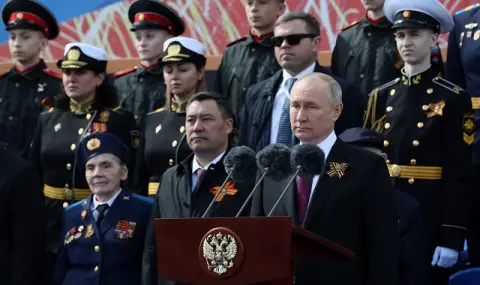The Kremlin continues to recast positions that Russian officials have repeatedly used to justify Russian invasions of Ukraine, with the aim of further militarizing Russian society in the long term, possibly in preparation for a potential future protracted conflict with NATO.
This is what the Institute for the Study of War (ISW) warns about in its analysis.
On April 20, Russian news journalist Pavel Zarubin asked Russian Foreign Minister Sergei Lavrov about the EU's recommendation that European leaders refrain from participating in the Russian Victory Day parade on May 9 in Moscow.
Victory Day is the main a patriotic holiday in Russia. It commemorates the Soviet Union's contribution to the victory over Nazi Germany in World War II, known in Russia as the Great Patriotic War.
Lavrov accused the EU of fomenting "neo-Nazi ideology" in Europe, and said that Russia "will make every effort to ensure that this ideology does not raise its head", and will destroy Nazism "once and for all".
Lavrov's statements are part of the Kremlin's long-standing efforts to invoke the Soviet Union's contribution to the victory over Nazi Germany and the broader myth of the Great Patriotic War to denigrate Europe and NATO.
These efforts are aimed at exacerbating negative sentiment among the Russian population and garnering support for the long-term militarization of Russian society.
From Odessa, Mark Rutte reaffirmed NATO's unwavering support for Ukraine.
The alliance will continue to help Ukraine defend itself and deter future aggression.
The Kremlin has previously invoked the myth of the Great Patriotic War to convince the Russian population that increasing its social and economic sacrifices for the Russian war effort in Ukraine could help achieve a crushing victory.
Russian President Vladimir Putin and other senior Kremlin officials regularly invoke the vague term "denazification" to call for regime change in Ukraine and the establishment of a pro-Russian puppet government, and Putin has used claims that alleged Nazis control the Ukrainian government to justify a full-scale invasion in February 2022.
The Kremlin is increasingly using the same playbook of false accusations that it used against Ukraine against Finland and former Soviet states, including Estonia and Moldova, to justify its attempts to control independent states and create the information conditions for possible future Russian aggression.
Russian President Vladimir Putin's proposed surprise Easter truce underscores the need for the text of any ceasefire or peace agreement to be publicly available, to be formally agreed in advance with all parties, and to include robust monitoring mechanisms.
Ukrainian President Volodymyr Zelensky announced that Russian forces had not carried out long-range strikes against Ukraine on the night of April 19-20 and during the day of April 20, and proposed a temporary moratorium on long-range strikes against civilian infrastructure.
Ukrainian officials continue to highlight the Kremlin's systematic persecution of religious communities across occupied Ukraine, including Christians.
